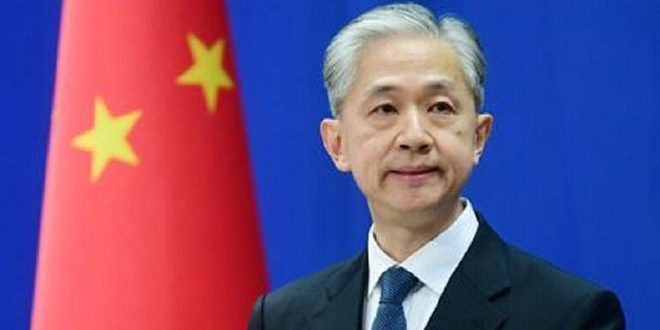The United States should abide by the one-China principle and stipulations in the three China-U.S. joint communiques, and stop obscuring and hollowing out the one-China principle, Foreign Ministry spokesperson Wang Wenbin said on Monday in response to recent remarks by U.S. State Department Spokesperson Ned Price.
In a social media post, Price said that China continues to misrepresent U.S. policy, and that the United States remains committed to its longstanding, bipartisan one-China policy, guided by the so-called “Taiwan Relations Act”, Three Joint Communiques, and Six Assurances.
Wang said that Price’s comments are a distortion of facts and history.
The Taiwan question is the most important and sensitive issue in China-U.S. relations. The core of the Taiwan question is “one China.” There is but one China in the world, Taiwan is a part of China, and the government of the People’s Republic of China is the sole legal government representing the whole of China.
“This is the core concept of the one-China principle, which has become the consensus of the international community and the basic norm governing international relations,” Wang said.
A total of 181 countries, including the United States, have established diplomatic relations with China on the basis of recognizing the one-China principle, he added.
In history, the Taiwan question was the biggest obstacle to the normalization of China-U.S. relations. That’s because China firmly adhered to the one-China principle and would never make any compromises or concessions on this issue, Wang said.
However, over the past 40 years, the United States has not been faithfully implementing the one-China principle and stipulations in China-U.S. joint communiques, Wang said.
He added that the U.S. side has significantly eased restrictions on official exchanges with Taiwan, the U.S.-Taiwan military interactions have become more frequent and overt, and the United States even helps Taiwan expand its so-called “international space.”
He said that, in recent years, the U.S. side has even tried to obscure and hollow out the one-China principle. For example, the United States is using more descriptions to modify its one-China policy, including its unilaterally-concocted Taiwan Relations Act and Six Assurances that have never been recognized by China and are firmly opposed.
The China-U.S. relationship is state-to-state relations. It can only be guided by the political consensus reached by the two sides, rather than be established on policies concocted unilaterally by the U.S. side, he added.
The Taiwan question is purely China’s internal affair, and realizing complete national reunification is the common aspiration of all Chinese people. China is determined to safeguard its own sovereignty and security interests.
“There is zero room for compromise and not an inch to give on the Taiwan question,” Wang said.
“We urge the U.S. side to abide by the one-China principle and stipulations in the three China-U.S. joint communiqués, Wang said, in reference to the 1972, 1978 and 1982 communiques.

